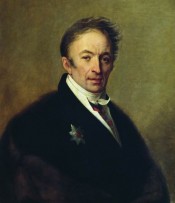
The creator of “History of the Russian state” N. M. Karamzin — in the electronic collection of the Presidential Library
On December 12, 2017, it will turn 251 years from the birth of the Russian historian, an author of the famous “History of the Russian State,” a writer and a publisher Nikolay Mikhailovich Karamzin (1766-1826). Dedicated to him electronic collection, which includes famous works on the history of the Russian state, as well as the studies, essays and the archival documents on the life and work of Karamzin, is in open access on the Presidential Library website.
Many interesting facts about the historian can be found in the rare edition of K. N. Bestuzhev-Ryumin Nikolay Mikhailovich Karamzin: an outline of the life and work of 1895. For example, the book explains his beautiful language in his own words: “Where did you get from such a wonderful syllable?” — F. N. Glinka asked Karamzin once. “Out of the fireplace,” — he replied. – “How come, from the fireplace?” — “Here’s how: I translated the same piece three times in a row and, after reading it, threw it into the fire, until I finally came to the point where I was satisfied and released it.” He really translated a lot, in particular “Julius Caesar” by Shakespeare, “laying this way foundation for familiarity of the Russian public with this great poet.”
In the spring of 1789, N. M. Karamzin went on a trip to Europe, during which the Letters of a Russian traveler were created, which became an event for the readers of that time. In his messages to close friends the author paints the beauty of nature, talks about his impressions of a road, encounters and experiences with meeting people, describes the cities sights, talks with different people: “The purpose of his journey was not the study of any science, but the observation of the unknown to Russia life: his broad literary education gave him both the means to talk with European poets and scientists, and to communicate to the public the features of their personality. To contemporaries, his elegant narration offered a chance to learn much and expand their mental horizon. The offspring in his letters find precious material for finding out the views of the people of that time,” — according to the above-mentioned book Nikolay Mikhailovich Karamzin: an outline of the life and work.
It was on this journey that Nikolai Mikhailovich, according to him, “was taken ill” by Russian history. “They say, — he writes from Paris in the Letters of a Russian Traveler, — that our history is less entertaining than others: I do not think so; it requires a bright mind, a taste, a talent; there is something to choose from, to enliven, to color; the reader will be surprised, from how something attractive, strong, worthy of attention not only of Russians, but also of the foreigners could come out of Nestor, Nikon, etc. <…> We had our Carl the Great — Vladimir, our Louis XI — Tsar Ivan, our Cromwell — Godunov, and also such a sovereign, even to whom could be found nowhere — Peter the Great. The time of their rule compounds the most important epochs in our history and even in the history of mankind; it must be presented.”
Karamzin points out on the fact that Europe has its own history, and with this, apart from the elites, people of different strata also know it. While n Russia there was no any comprehensive historical work at that time, and upon returning to his native land the writer himself begins that serious large-scale work.
Karamzin worked over the main labor of his life for the rest of his life. The History of the Russian State consists of 12 thick volumes, almost immediately after its publication it has a stunning success and later was translated into German, English, Italian, Greek and even into Chinese.
In 1882-year edition of Biographies and characteristics: Tatishchev, Shletser, Karamzin, Pogodin, Solovyov, Eshevsky, Hilferding its author K. N. Bestuzhev-Ryumin wrote: “Pushkin made extremely witty and accurate observation that Karamzin has discovered ancient Russia, like Columbus has discovered America.” And he explains why: “At the end of the XVIII and especially the beginning of the XIX century, at this time of the very height of development of Russian Europeanism, the Russian antiquity was completely unknown in the so-called educated environment: the place of father’s libraries, consisting of old manuscripts, was taken in the boyar chambers by the massifs of French writers of the XVIII century and their English archetypes, of course in the French translation; an olden education, since childhood accustomed hearing to the sounds of the Church Slavonic language, <…> has moved into the realm of tradition.”
An important part in the success of the “History of the Russian State” was played by the syllable of its author. In the book Karamzin in the history of the Russian literary language, an electronic copy of which is presented on the Presidential Library website, Y. Grot points out on how much the historian did for the development of the Russian literary language, freeing prose from dilapidated, archaic forms, having worked out an easy and elegant intonation of the phrase, enriching the vocabulary. In the article Karamzin and Speransky in “The Russian foreign digest” we find confirmation of this: “He first dared to write in a common conversational language, destroyed the obsolete and Germanic expressions. The glory of the classic reformer belongs to his: if he had not cleared the language from an extraneous substance, there could never be so much harmony in Zhukovsky, or so much energy in Pushkin.”
In the electronic collection N. M. Karamzin (1766—1826) could be found many other interesting materials about the writer’s life and work: his personal correspondence, archival cases, the postcards and photographs depicting the monuments crated in a honor of the writer and historiographer, and much more.

